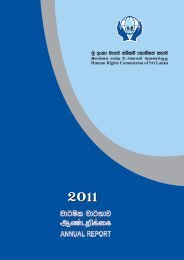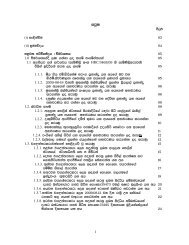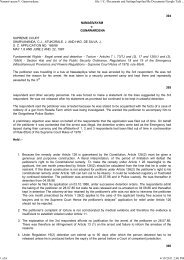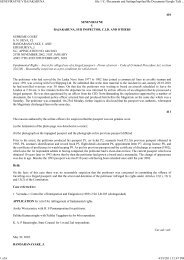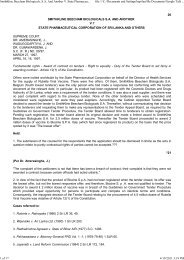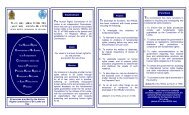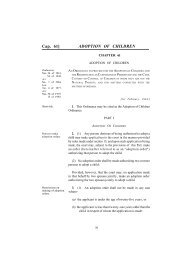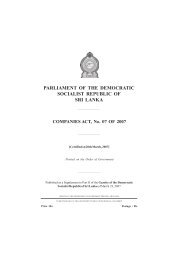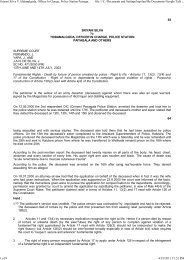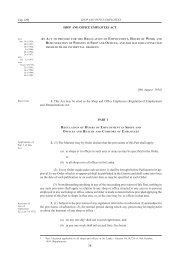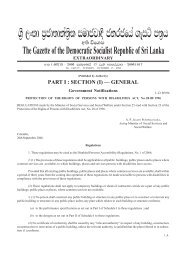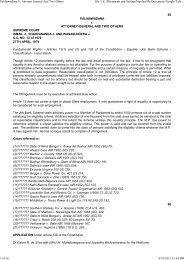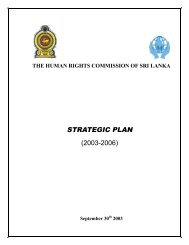Gamini Dissanayake (Petitio... - Human Rights Commission of Sri ...
Gamini Dissanayake (Petitio... - Human Rights Commission of Sri ...
Gamini Dissanayake (Petitio... - Human Rights Commission of Sri ...
You also want an ePaper? Increase the reach of your titles
YUMPU automatically turns print PDFs into web optimized ePapers that Google loves.
<strong>Gamini</strong> <strong>Dissanayake</strong> (<strong>Petitio</strong>ner In Sc 4/91) V. Kaleel, M.C.M. And Others file:///C:/Documents and Settings/kapilan/My Documents/Google Talk ...<br />
hearing does not admit <strong>of</strong> a single answer applicable to all situations in which the issue may arise. Whilst it is difficult<br />
to reconcile all the relevant cases, recent case-law indicates that the courts are increasingly favouring an approach<br />
based in large part on an assessment <strong>of</strong> whether, in a particular context, the procedure as a whole gave the<br />
individual an opportunity for a fair hearing, Thus, when a provision is made by statute or by the rules <strong>of</strong> a voluntary<br />
association for a full re-hearing <strong>of</strong> the case by the original body (constituted differently where possible) or by some<br />
other body vested with and exercising original jurisdiction, a court may readily conclude that a full and fair hearing will<br />
cure any defect in the original decision ............." (pp 242-243)<br />
Wade makes the following observations in regard to the same question:<br />
" Whether a hearing given on appeal is an acceptable substitute for a hearing not given, or not properly<br />
given, before the initial decision is in some cases an arguable question. In principle there ought to be an observance<br />
<strong>of</strong> natural justice equally at both stages ; and accordingly natural justice is violated if the true charge is put forward<br />
only at the appeal stage. If natural justice is violated at the first stage, the right <strong>of</strong> appeal is not so much a true right<br />
<strong>of</strong> appeal as a corrected initial hearing : instead <strong>of</strong> fair trial followed by appeal, the procedure is reduced to unfair<br />
trial followed by fair trial. This was pointed out by Megarry, J., in a trade union expulsion case, holding that, as a<br />
general rule, a failure <strong>of</strong> natural justice in the trial body cannot be cured by a sufficiency <strong>of</strong> natural justice in the<br />
appellate body ..............................<br />
According to the Privy Council, however, Megarry, J. 's 'general rule' was too broadly stated, since in some<br />
cases members <strong>of</strong> organisations, whose rights depend upon contract, should be taken to have agreed to accept<br />
what in the end is a fair decision, notwithstanding some initial defect. An appeal to the committee <strong>of</strong> the Australian<br />
Jockey Club was held, for this reason, to cure an initial decision <strong>of</strong> the stewards which failed to observe the<br />
principles <strong>of</strong> natural justice in disqualifying the owner <strong>of</strong> a horse found to have been raced improperly<br />
................................<br />
In the case <strong>of</strong> a public authority acting under statutory powers it would seem paradoxical to interpret the<br />
provision <strong>of</strong> a right <strong>of</strong> appeal as meaning that the initial decision may be any less fair than it would have to be if not<br />
subject to appeal. In Ridge v. Baldwin the House <strong>of</strong> Lords did not allow the chief constable's unsuccessful<br />
administrative appeal to the Home Secretary to prejudice his right to a fair hearing before the watch committee. Nor<br />
does a full hearing on appeal justify cancellation <strong>of</strong> a taxidriver's licence or dismissal <strong>of</strong> a school-teacher without an<br />
initial hearing. Nevertheless it is always possible that some statutory scheme may imply that the 'appeal' is to be the<br />
only hearing necessary. And an appeal may have greater curative effect where the appeal tribunal has original as<br />
well as appellate jurisdiction." (pp 487-489)<br />
The following are the principles which seem to me to be applicable. If an order is " provisional ", and is<br />
subject to appeal or objection, antecedent hearing is probably not necessary. If it is final, but by statute or contract<br />
there is provision (a) for a "full re-hearing ' by the same or another body having original jurisdiction, or (b) making the<br />
decision and an appeal against it (especially if it is by way <strong>of</strong> " full re-hearing ") part <strong>of</strong> an integral scheme, it may be<br />
that an initial hearing is dispensed with, or that the absence there<strong>of</strong> is not fatal. Where the re-hearing is appellate in<br />
nature, even if it has been partially successful (as in Ridge v. Baldwin) it will seldom cure the initial defect ;<br />
particularly where the initial error is grave and the decision has serious consequences for the individual. It is vital that<br />
the procedure as a whole must give the individual an opportunity for a fair hearing. What has been said above about<br />
" re-hearing " and " appeals " does not apply at all to applications for judicial review or proceedings under Article 99<br />
(13) (a). The fact that Certiorari lies in respect <strong>of</strong> a decision can never be a circumstance which will dispense with<br />
the need for an antecedent hearing. The anomalies inherent in the Respondents' contention can be illustrated : if<br />
disciplinary proceedings are taken against two Party members - one a Member <strong>of</strong> Parliament, the other not - it can<br />
never be that an antecedent hearing is required for the latter, but not for the former, simply because <strong>of</strong> Article 99<br />
(13) (a). Further the proceedings before us cannot in any way be considered a " re-hearing ", let alone a " full<br />
re-hearing ". Procedural and time constraints prevented a full investigation by this Court. The precise charges relied<br />
on by the<br />
Respondents became clear only in the course <strong>of</strong> their Counsel's reply, and it was only then that the question<br />
<strong>of</strong> the adequacy <strong>of</strong> the <strong>Petitio</strong>ners' explanation for the lack <strong>of</strong> internal discussion could be properly appreciated. Had<br />
we to determine, by way <strong>of</strong> a " full rehearing ", matters such as Party policy as to the system <strong>of</strong> government, the<br />
relevant documents (decisions <strong>of</strong> Party Convention, Manifestos, etc) would have become necessary. I therefore hold<br />
that the Constitutional remedy under Article 99 (13) (a) does not relieve the Party <strong>of</strong> the duty to afford an antecedent<br />
hearing in disciplinary matters, and does not cure the lack <strong>of</strong> a hearing.<br />
" No evidence " : Finally learned President's Counsel for the Respondents submitted that the <strong>Petitio</strong>ners had<br />
31 <strong>of</strong> 56 4/20/2011 1:18 PM<br />
195<br />
196



